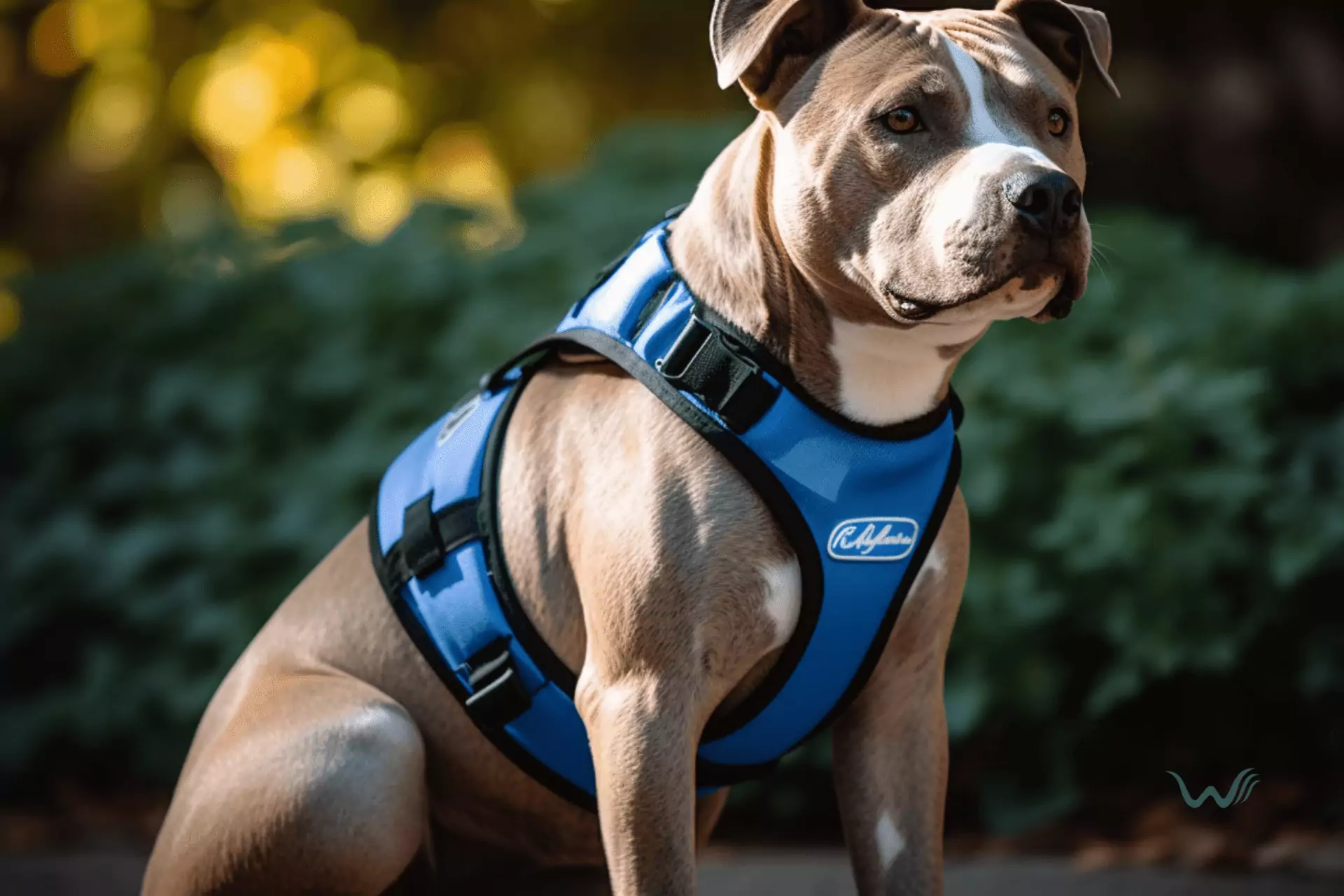

Can A Pitbull Be A Service Dog?
by Haley Mills
Last updated: April 21, 2024
Verified and Approved by:
Angela Morris,
MSW, LCSW
Fact Checked

Can a Pitbull be a service dog? This question has sparked much debate and controversy among dog lovers and disability advocates alike. Service dogs play a crucial role in assisting individuals with disabilities, providing them with the support and independence they need to navigate their daily lives.
While certain breeds are commonly associated with service dog work, such as Labradors and Golden Retrievers, there is a growing interest in exploring the potential of Pitbulls as service dogs.
In this article, we will uncover the training process for service dogs, the temperament and characteristics of Pitbulls, legal considerations, and share success stories of Pitbulls as service dogs.
Service dogs undergo intensive training to perform specific tasks that aid individuals with disabilities. From guiding the visually impaired to alerting those with hearing impairments, these dogs offer invaluable assistance. The training process includes obedience training, socialization, and task-specific training. While breeds like Labradors and Golden Retrievers are commonly selected for service dog work due to their temperament and trainability, Pitbulls have also shown potential in this field.
Understanding Service Dogs and Their Roles
So, you might be wondering if a pitbull can actually be a service dog. The answer is yes! Pitbulls, like any other breed, can be trained to become service dogs and perform a wide range of tasks to assist individuals with disabilities.
Service dogs are highly trained to provide specific services to their handlers and are protected by laws such as the Americans with Disabilities Act (ADA) in the United States. Service dogs are not limited to a specific breed or size. What matters most is their ability to perform the tasks required to assist their handlers.
These tasks can include guiding individuals who are blind or visually impaired, alerting individuals who are deaf or hard of hearing to sounds, providing stability and balance to individuals with mobility impairments, and even detecting and responding to seizures or other medical emergencies.
The critical thing to remember is that service dogs must be well-trained, obedient, and have the right temperament for the job. Pitbulls, like any other breed, can be trained to meet these requirements and can excel as service dogs. Focusing on the individual dog’s abilities, temperament, and training is crucial rather than making assumptions based solely on their breed.
With the right training and socialization, pitbulls can make excellent service dogs and provide invaluable assistance to their handlers.
The Training Process for Service Dogs
When training a service dog, you’ll need to follow a specific process to ensure they are properly trained and able to assist their handler.
This process typically includes basic obedience training, specialized task training, and socialization.
Basic obedience training teaches the dog essential commands such as sit, stay, and come. This foundation is important for the dog to understand how to behave in various situations.
Specialized task training involves teaching the dog specific tasks that they will need to perform to assist their handler. These tasks can vary depending on the handler’s needs, but may include tasks such as retrieving items, opening doors, or alerting to medical conditions.
Socialization is also a crucial part of the training process, as it helps the dog become comfortable and well-behaved in different environments and around various people and animals.
Throughout the training process, positive reinforcement techniques are typically used. This involves rewarding the dog for correct behavior and ignoring or redirecting undesirable behavior.
Consistency and patience are key when training a service dog, as it can take several months or even years for them to become fully trained.
The Temperament and Characteristics of Pitbulls
Imagine a loyal and affectionate canine companion with a strong and confident demeanor, making it an ideal candidate for service work. This description perfectly fits the temperament and characteristics of pitbulls.
Despite their often misunderstood reputation, pitbulls are known for their loyalty, intelligence, and eagerness to please their owners. These traits, combined with their physical strength and agility, make them well-suited for a variety of service tasks.
Pitbulls are naturally inclined to form strong bonds with their owners and are highly trainable. They’re known to be eager learners and respond well to positive reinforcement training methods. This makes them highly adaptable to the rigorous training required for service work.
Additionally, pitbulls are known for their unwavering loyalty and devotion to their owners. They thrive on human companionship, making them highly attentive and responsive to the needs of their handlers.
Furthermore, pitbulls possess a confident and calm demeanor, which is essential for a service dog. They’re typically not easily startled or frightened, and their stable temperament allows them to remain focused and composed in various environments and situations. This quality is crucial for a service dog as they need to remain calm and reliable even in stressful or challenging situations.
Can A Pitbull Be Trained as a Service Dog Without Being Leashed?
Yes, according to the service dogs leashed rule, pitbulls can be trained as service dogs without being leashed. However, they still need to undergo proper training and meet the requirements to be certified as service dogs. With the right training and temperament, pitbulls can excel as service dogs.
Can Cavapoo Dogs also be trained to be Service Dogs like Pitbulls?
The cavapoo breed dogs overview might surprise you as they can indeed be trained to be service dogs, just like pitbulls. With their intelligent and obedient nature, cavapoos can excel in tasks such as emotional support, therapy, and even assistance for individuals with disabilities.
What Qualities Make Pitbulls Suitable as Service Dogs?
Pitbulls possess the ideal qualities to excel as service animals. Their intelligence, loyalty, and eagerness to please make them well-suited for this role. Their strong work ethic and willingness to learn enable them to perform a wide range of tasks, setting them apart from other breeds such as german shepherds as service animals.
Legal Considerations for Pitbulls as Service Dogs
One important factor to consider is the legal perspective on using pitbulls as service animals. In the United States, the Americans with Disabilities Act (ADA) defines a service animal as a dog individually trained to perform tasks for a person with a disability. The ADA doesn’t specifically exclude any dog breed from being a service animal, including pitbulls. Therefore, legally speaking, a pitbull can be a service dog if it meets the requirements set forth by the ADA.
However, individual states and municipalities may have their own laws and regulations regarding pitbulls. Some jurisdictions may have breed-specific legislation (BSL) in place that restricts or bans certain breeds, including pitbulls. These laws can vary greatly, and it’s essential to research and understand the specific regulations in your area.
If there are restrictions or bans on pitbulls in your jurisdiction, it may impact your ability to legally use a pitbull as a service dog. It’s crucial to consult with a legal professional or service animal organization to navigate the legal considerations and requirements for using a pitbull as a service dog in your specific location.
Success Stories of Pitbulls as Service Dogs
Several heartwarming success stories showcase the incredible abilities of pitbulls as service dogs. One such story is that of Lilly, a pitbull who was trained to be a service dog for a young boy with autism. Lilly had a natural ability to sense when the boy was feeling anxious or overwhelmed, and she would provide comfort and support by licking his face and cuddling up next to him. The bond between Lilly and the boy was undeniable, and she quickly became an integral part of his life, helping him navigate the challenges of his condition with ease.
Another success story is that of Max, a pitbull trained as a service dog for a military veteran suffering from post-traumatic stress disorder (PTSD). Max was able to provide a sense of security and comfort to his owner, alerting him to potential triggers and helping to calm him during moments of anxiety or panic. Max’s unwavering loyalty and dedication to his owner’s well-being significantly impacted his quality of life, allowing him to regain a sense of independence and confidence.
These success stories demonstrate that pitbulls can indeed be highly effective service dogs. Their intelligence, loyalty, and natural intuition make them well-suited for the role, and they have proven time and time again that they’re capable of providing invaluable support and assistance to individuals with various disabilities and conditions.
Certify Your Emotional Support Animal Today

Why You Can Rely on Us?
At Wellness Wag, we believe your pet deserves care rooted in both science and compassion. Each article is carefully researched, written in clear language for pet owners, and then reviewed by qualified professionals to ensure the information is evidence-based, current, and practical for real-life care. Our goal is to help you feel confident in making informed decisions about your pet’s health and well-being.
Reviewed by
Angela Morris, MSW, LCSW
Angela is a licensed clinical social worker with 20 years of experience in patient advocacy and community mental health. She has assisted numerous clients with ESA evaluations and brings a deep understanding of disability accommodations, ensuring that all information is accurate, supportive, and practical.

Written by :
Haley Mills
Last Updated :
April 21, 2024












